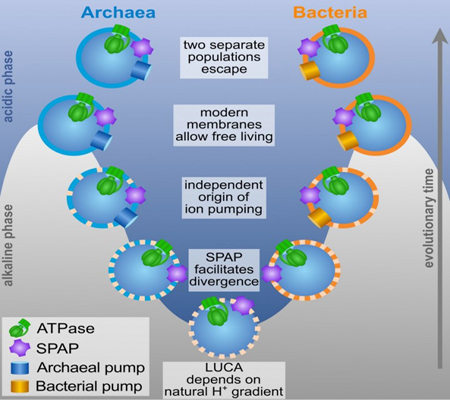'Leaky' membrane fueled life on earth 4-bln-yrs ago
 Washington, Aug 13 : A new study may finally unravel four-billion-year mystery about how life evolved on earth, as it has suggested that "leaky" membrane in our last common ancestor, a single-celled organism that spurred growth.
Washington, Aug 13 : A new study may finally unravel four-billion-year mystery about how life evolved on earth, as it has suggested that "leaky" membrane in our last common ancestor, a single-celled organism that spurred growth.
According to scientists, life's Last Universal Common Ancestor (LUCA) had a "leaky" membrane that helps answer biology's biggest questions, including why cells use the same complex mechanism to harvest energy and why two types of single-celled organism - bacteria and archaea - have completely different cell.
Lead researcher of the study Nick Lane from University College London's (UCL) department of biosciences said that the leakiness of the membrane allowed LUCA to be powered by energy in its surroundings, most likely vents deep on the ocean floor, whilst holding in all the other components necessary for life.
The team modelled how the membrane changed, enabling LUCA's descendants to move to new, more challenging environments and evolve into two distinct types of single-celled organism - bacteria and archaea - creating the deepest branch of the tree of life to find answers in the structure and function of LUCA's membrane.
The researchers said that the new model can explain the fundamental differences between bacteria and archaea and makes some clear predictions that they plan to test in the future.
The study suggests that LUCA lived in the area where ancient seawater, dense with positively charged particles called protons, mixed with warm alkaline vent fluid, which contained few protons and the difference in the concentration of protons across these two environments enabled protons to flow into the cell, driving the production of a molecule called adenosine triphosphate (ATP) which powered the growth of cells, just as it does today.
However, unlike modern cells, scientists believe this could only happen if the membrane was "leaky" - enabling protons to leave the cell spontaneously so more protons could enter to power growth, as modern 'non-leaky' membranes had to evolve later and they did so independently in archaea and bacteria,".
The study was published in the journal PLOS Biology. (ANI)